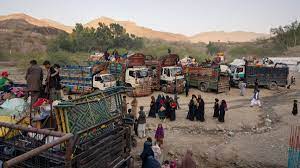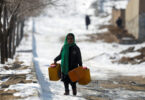KABUL (Khaama Press): According to reports, a non-profit organization in Canada has disclosed that six Afghan families who were awaiting relocation to Canada have been returned from Pakistan to Afghanistan.
“I’m extremely concerned by the current stance that Pakistan has taken to deport Afghans out of the country,” said Jon Feltham, an Afghan war veteran and program director for Aman Lara. CBC News reported that this non-profit works to evacuate people from countries in crisis.
“We’re taking them out of one hotspot, and what we’re doing now is putting them into another.”
Feltham emphasized that these deportations highlight the pressing necessity for Immigration, Refugees and Citizenship Canada (IRCC) to expedite the processing of paperwork for Afghans seeking refuge in Canada.
The situation on the ground is increasingly dire, and delays in processing applications could result in more individuals facing deportation and being exposed to potential harm.
Towards the end of October, Pakistan initiated a crackdown on what it described as undocumented Afghan migrants, detaining and subsequently deporting them. This development has raised concerns about the safety and well-being of Afghan asylum seekers, especially given the volatile situation in Afghanistan. It underscores the need for international cooperation and swift action to protect vulnerable individuals seeking safety and security in other countries.
The exact number of Afghans seeking to come to Canada through special immigration measures for former employees of the Canadian Armed Forces or the federal government remains undisclosed. The Immigration, Refugees and Citizenship Canada (IRCC) has cited operational security concerns for not revealing this information.
Aman Lara, an organization dedicated to assisting Afghans with an “enduring relationship with the government of Canada,” estimates that it has supported nearly 2,500 individuals in temporarily relocating to Pakistan while awaiting further steps in their immigration process.
While the organization couldn’t provide an exact count for the six families affected, it referenced the United Nations estimate that an average Afghan household consists of approximately eight people. This highlights the potential scale of the impact on these families and the urgency of their situation.
The lack of transparency regarding the number of Afghans seeking refuge in Canada and the challenges faced by organizations like Aman Lara underscores the complexities of the Afghan refugee crisis and the importance of coordinated efforts to provide assistance and support to those in need.
CBC News interviewed Sanaullah Azizi, who reported being arrested in Islamabad on Monday while running an errand with his wife. Azizi and his wife, along with other migrants, endured a 17-hour bus journey before being left at the Afghanistan border. His presence in Pakistan was in pursuit of approval to relocate to Canada, leveraging his father-in-law’s prior role as an interpreter for the Canadian Armed Forces.
Azizi explained that he never had the opportunity to pursue his relocation plans. “They snatched my phone right away,” he revealed through an interpreter to CBC, noting that the device contained all his documents and was his sole connection to the outside world. The phone was only returned after they were left at the border, leading him and his wife to go into hiding in Afghanistan since then.
This comes as the Ministry of Immigration, Refugees and Citizenship Canada had previously declared that Afghan citizens with pending Canadian immigration cases should not be deported from Pakistan. It is worth noting that hundreds of Afghan citizens, who had cases pending with countries like the United States, Canada, and Europe, sought refuge in Pakistan following the takeover of the Taliban.
Furthermore, Canada’s immigration department had previously announced plans to relocate over 30,000 Afghan citizens as part of a program to bring 40,000 Afghans to Canada.
However, over the past two years, Canada has predominantly transported Afghan refugees from Pakistan, Tajikistan, and the United Arab Emirates through charter flights to the country.







